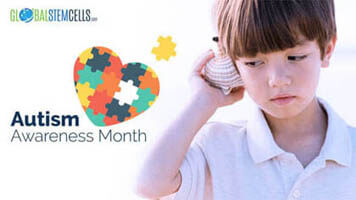Autism Awareness Month is observed in April and this year’s focus is to actively involve friends and partner organisations to help instill the values of acceptance and appreciation to everyone even remotely connected with the condition.
What is Autism?
Autism (or Autism Spectrum Disorder) is observable as a mental condition, present from early childhood, and is characterised by difficulty in communicating and forming relationships and in using language and abstract concepts. The complex disorders of brain development that constitute Autism Spectrum Disorder (ASD) are also observable through repetitive behaviours.
The Centers for Disease Control and Prevention (CDC) estimates that fully 1% of the world’s population has Autism Spectrum Disorder. It is a heartbreaking ailment as it tends to render its victims unemployable, creating dependency and exerting pressure on existing resources.
Not too long ago people with Autism were placed in mental institutions. The nature of the condition and its characteristics were easy to generalise and pigeon-hole. Thankfully, through research and observation, fuller information is now available and children with autism are now able to grow, learn and flourish, certainly at a different rate than others but also at a plane that the rest of us can never fully comprehend.
Treating Autism
There is no universal remedy for Autism. There are however different education approaches and treatments that work by addressing the unique challenges presented by the disease. It is important to note that individuals present differing symptoms and therefore each one requires a different approach to the management of their condition. Emphasis is naturally laid on the necessity of early treatment and integrating the individual’s strengths to effectively counter his or her weaknesses and needs.
The last half century has seen the focus of the Autism Society through the platform of the National Autism Awareness Month centre mostly on individuals living with autism. This year, while those living with autism still remain the centre of attention, time and resources will also be spent on those who care for and interact with people living with autism. This added dimension to the National Autism Awareness Month brings to the fore the crucial auxiliary aspect of other participators, ensuring acceptance and inclusion in schools and other communal places. The stated aim is to create a society where those with Autism Spectrum Disorder are appreciated and valued for their unique talents while entrenching a non-discrimination policy.
To achieve the objectives of the National Autism Awareness Month there are a number of activities lined up that will include local events and activities. The possibility of setting up ‘supportive places’ where those affected by Autism and their families can find help and guidance has been mooted.
By its very nature, and its appearance in early childhood, schools still present the best place for educating those of us fortunate enough not to suffer from the condition and set us on the long road to demystifying ASD. This will be achieved by creating changes in perception through the promotion of inclusion and acceptance in the classroom (and elsewhere) and ultimately learning to live together. Consequently a good number of the activities lined up will be school-based this April in celebrating National Autism Awareness Month.
If you would like any information about the use of stem cell therapy as a treatment option for Autism, please contact us.




 English
English